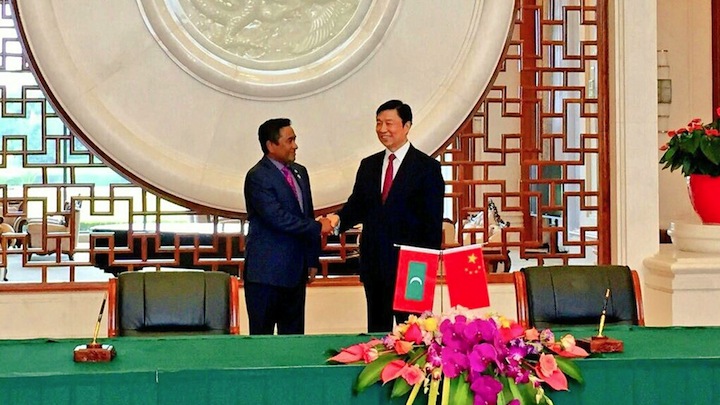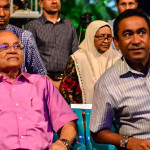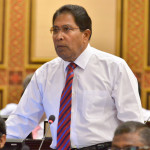Proposed constitutional amendments to allow foreign ownership of land in the Maldives will allow China to establish military facilities in the Maldives and destabilise the Indian Ocean, a source within the main opposition Maldivian Democratic Party (MDP) has said.
The amendments will allow foreigners who invest in a project worth more than US$1 billion to purchase land, meaning it can facilitate “foreign non-commercial logistical facilities” on such plots.
Since the ruling Progressive Party of the Maldives (PPM) holds a majority in the parliament, the government can allow and regulate military activity on such land through other legislation, the source who wished to remain anonymous said.
In a more carefully worded statement shared with the media, the MDP said: “Being a center right political party, the Maldivian Democratic Party in principle believes in free ownership of land and property. Nevertheless, the amendments can facilitate foreign non-commercial logistical installations in the Maldives.
“The MDP Parliamentary Group Leader Hon. Ibrahim Mohamed Solih speaking on the bill on Tuesday night reiterated MDP’s call to guarantee national security, safeguard stability, peace and security of the Indian Ocean. This therefore forms the MDP position.”
The amendment will be put up for a vote today.
A three-fourths majority or 64 votes is required to amend the constitution. A total of 62 MPs voted to accept the amendment at midnight on Tuesday at an extraordinary parliamentary session. Parliamentary standing orders have been amended to fast-track the process of passing a bill into law.
PPM MPs were not responding to calls at the time of going to press.
Majority leader Ahmed Nihan said last night that the amendments will not affect the Maldives’ sovereignty, while MP Ali Arif said no land will be given for military purposes. The ruling party says the amendment would increase economic growth and facilitate sustainable investment in the Maldives.
President Abdulla Yameen has declared a foreign policy shift to the East last year. Chinese president Xi Jingping was the first head of state since Yameen assumed power and the first Chinese president to visit the Maldives.
During the visit, the Maldives agreed to become a partner in China’s maritime silk route, a trade route from China’s Fujian province to the Mediterranean Sea via South Asia and East Africa.
China is providing grant and loan assistance to the Maldives to build a bridge between the capital and the airport. Chinese companies are involved in airport development and have now been handed islands for resort development.
In January, the MDP alleged the government was making plans to award parts of south central Laamu Atoll to China for a military base. The Chinese embassy promptly dismissed the allegations as “completely false.”
“It is a common knowledge that China pursues a national defense policy that is defensive in nature,” read the press release. “China does not maintain any military in any foreign country.”
Several independent and opposition MPs voted against the amendment last night, contending it will allow the government to sell the Maldives off as it gives unprecedented access to foreign parties to operate in the Maldives, especially with the enactment of the Special Economic Zones (SEZ) Act last year.
The SEZ Act gives investors and developers major tax breaks and exemption from regulatory provisions in financial, environmental and labour laws.
At the time, the opposition contended that the SEZ law would pave the way for money laundering and other criminal enterprises, undermine the decentralisation system and authorise a board formed by the president to openly sell off the country without parliamentary oversight.
The government and the MDP are currently negotiating for the release of opposition leader Mohamed Nasheed and other jailed politicians.
The opposition has backed several government proposals including the impeachment of vice president Dr Mohamed Jameel Ahmed on Tuesday and a constitutional amendment setting new age limits of 30-65 years for the presidency.
President Abdulla Yameen has now appointed the influential tourism minister Ahmed Adeeb as the new vice president. His nomination will be approved by the People’s Majlis today.






